Woz Says Apple Owes Its Very Existence to the Principles Behind ‘Right to Repair’ Legislation
 Credit: Anton Gvozdikov / Shutterstock
Credit: Anton Gvozdikov / Shutterstock
Toggle Dark Mode
On the heels of reports that the Right to Repair movement is poised to become a national issue, one proponent of the legislation reached out to Apple’s legendary co-founder, Steve Wozniak, to get his take on customers’ rights to tinker with and repair their electronics. Perhaps not surprisingly, Woz affirmed that he stands behind the movement.
YouTuber and Right to Repair activist Louis Rossman, who runs the non-profit Repair Preservation Group Action Fund, recently sent Woz a request on Cameo, asking for his opinion on the right to repair.
In a great ten-minute video response that’s now available on YouTube, Woz responded by saying that he’s “always totally supportive” of the movement, and that he “totally thinks the people behind it are doing the right thing.”
We wouldn’t have had an Apple, had I not grown up in a very open technology world — an open electronics world.
Apple co-founder Steve Wozniak
In fact, Woz goes on to explain that although he’s done many Cameos, this one really got to him and affected him emotionally. He goes on to explain how he grew up in an “open source” world, where you could learn electronics at a very young age.
Those of us who come from Woz’s generation can identify with his comments about how in those days it wasn’t uncommon for tinkerers to build their own radios — every single part, transmitter, and receiver — almost from scratch.
Back then, when you bought electronic things like TVs and radios, every bit of the circuits and designs were included on paper. Total open source. Someone with skill could get in and modify things to fix broken radios or televisions, or to improve them, or to even replace destroyed parts.
Apple co-founder Steve Wozniak
As Woz goes on to explain, when starting Apple, it was this kind of hands-on experience that he had learned from his experience with radios and televisions that allowed him to design the first Apple computers, in an era when the very idea of hooking a computer up to a television set was virtually unheard of.
Woz also draws a comparison to the telephone company monopoly of the era — a time when “Ma Bell” didn’t allow you to hook up your own telephone to the lines coming into your house, much less an answering machine. In those days, you had to lease your phone from the telco — one clunky model that only came in black. Woz goes on to note that it took a “big antitrust suit” around the time that he and Steve Jobs started Apple to force the telephone companies to open things up to third parties.
Now companies were allowed to build stuff that connected to the electrical specs — the standards of ma Bell — and look at how many phones you could buy and answering machines at all the stores and so many choices that you had that you never had in the past with the monopoly.
Apple co-founder Steve Wozniak
With Apple vehemently opposing Right to Repair legislation, it’s hard to believe that there was a day when the company’s entire modus operandi was based on the opposite philosophy.
As Woz explains, the company’s very first computers were “modifiable to the max,” and users loved it.
Look at the Apple II. It shipped with full schematics, designs, software, and software source listings — totally open source. The Apple II was modifiable and extendable to the maximum. People figured out how to convert the early display into having lowercase characters and stuff with their own hardware added.
Apple co-founder Steve Wozniak
Woz also notes that Apple rode this wave of totally open and highly customizable systems for a decade, and it certainly wasn’t an accident that this was one of the things that contributed to Apple’s success.
This product was the only source of profits for Apple for the first ten years of the company. This was not a minor product, and it was not that successful on pure luck. There were a lot of good things about that being so open that everyone could join the party.
Apple co-founder Steve Wozniak
While Woz’s comments are obviously very much at odds with the ethos of the company that he co-founded, it’s also not the first time that he’s expressed opinions contrary to Apple’s policies. Back in 2016, he went on the record stating Apple should be paying much more in taxes, although he also lauded the company for its stance on privacy and security in the face of its battle with the FBI. He’s also openly questioned whether the Apple Card is discriminatory, and has criticized products like the original Apple Watch and once suggested that Apple make an Android smartphone.






